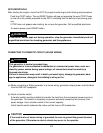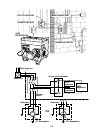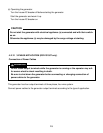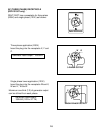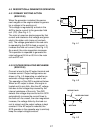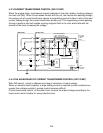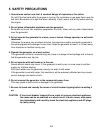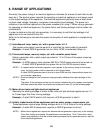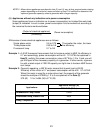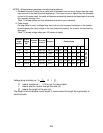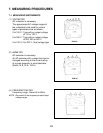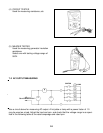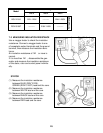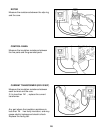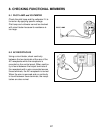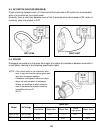
21
NOTE 2 : Motor-driven appliances mentioned in lets (3) and (4) vary in their required motor starting
power depending on the kind of motor and start-up load. If it is difficult to determine the
optimum generator capacity, select a generator with a larger capacity.
(5) Appliances without any indication as to power consumption
Some appliances have no indication as to power consumption; but instead the work load
(output) is indicated. In such a case, power consumption is to be worked out according to
the numerical formula mentioned below.
(Output of electrical appliance)
(Efficiency)
Efficiencies of some electrical appliances are as follows:
Single-phase motor 0.6 to 0.75 The smaller the motor, the lower
the efficiency.
Three-phase motor 0.65 to 0.9
Fluorescent lamp 0.7 to 0.8
Example 1 : A 40 W fluorescent lamp means that its luminous output is 40W. Its efficiency is
0.7 and accordingly, power consumption will be 40 0.7=57W. As explained in
Item(2), multiply this power consumption value of 57 W by 1.2 to 2 and you will
get the figure of the necessary capacity of a generator. In other words, a genera-
tor with a rated output of 1000 W capacity can light nine to fourteen 40W fluores-
cent lamps.
Example 2 : Generally speaking, a 400 W motor means that its work load is 400 W.
Efficiency of this motor is 0.7 and power consumption will be 400 0.7=570 W.
When this motor is used for a motor-driven tool, the capacity of the generator
should be multiple of 570W by 1.2 to 3 as explained in the Item (3).
570 (W) 1.2 to 3=684 (W) to1710 (W)
(Power consumption)
Applications
Applicable Wattage (W)
Incandescent Lamp, Heater 10000
Fluorescent Lamp, Electric Tool 4950
Pump, Compressor 2500
RGV12100 (60 Hz)



